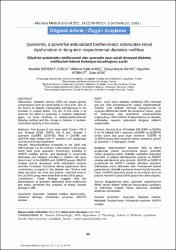Quercetin, a powerful antioxidant bioflavonoid, attenuates renal dysfunction in long-term experimental diabetes mellitus
Künye
Edremitlioğlu, M., Andiç, M. F., Kocakap, D. B. S., Korkut, O., Kısa Ü. (2011). Quercetin, a powerful antioxidant bioflavonoid, attenuates renal dysfunction in long-term experimental diabetes mellitus. Marmara Medical Journal, 24(2), 88 - 99.Özet
Objectives: Diabetes mellitus (DM) can cause serious complications such as nephropathy in long term. One of the factors of diabetic nephropathy pathogenesis is the increase of oxidant stress. The aim of this study is to examine the effect of quercetin, a powerful antioxidant agent, on renal functions in streptozotocin-induced diabetes mellitus and the change in balance of oxidantantioxidant capacity in this process. Methods: Five groups of rats were used: Control, DM 8 and 16-week (DM8, DM16), DM 8 and 16-week + quercetin (QUER8, QUER16). Rats in QUER8 and QUER16 were treated with IP quercetin (15 mg/kg/day) until the end of the experiment. Results: Malondialdehyte increased in the DM8 and DM16 groups. On the contrary, it decreased in the groups which were given quercetin. Accordingly, increase in NADPH oxidase activity, and decrease in superoxide dismutase and catalase activities in diabetic rats were determined. In the QUER8 and QUER16 groups, NADPH oxidase activity decreased while antioxidant enzyme activities increased. Functional kidney parameters were considerably corrupted in the diabetic rats. Sodium and water excretion via urine and plasma creatinine level in the QUER16 group were lower than in the DM16 group. Conclusion: These findings suggest that the administration of quercetin attenuated renal dysfunction and totally prevented the increase of kidney oxidant damage in DM.
















